必修2 Module 4 Fine Arts – Western, Chinese and Pop Arts 分词 课件(25张)
文档属性
| 名称 | 必修2 Module 4 Fine Arts – Western, Chinese and Pop Arts 分词 课件(25张) | 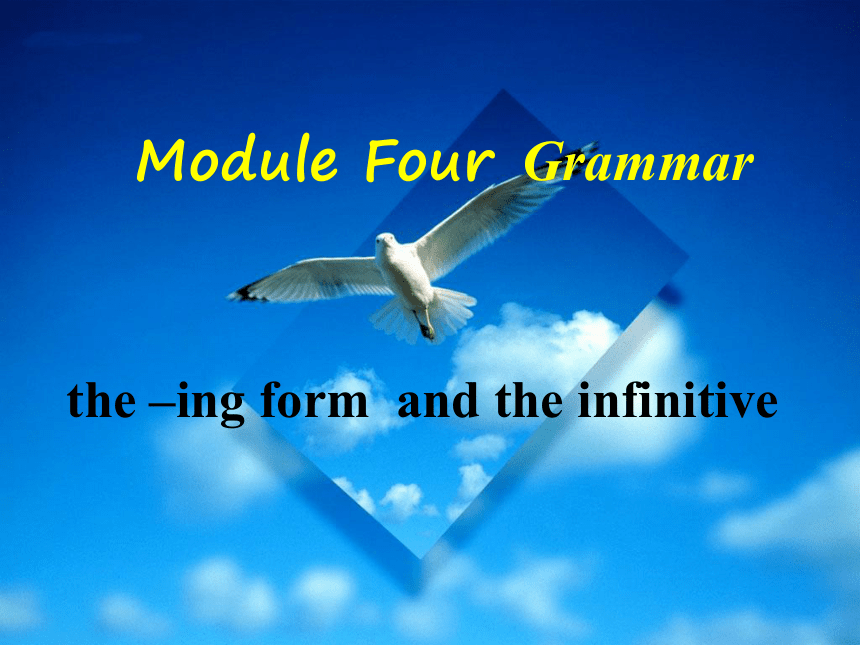 | |
| 格式 | zip | ||
| 文件大小 | 171.6KB | ||
| 资源类型 | 教案 | ||
| 版本资源 | 外研版 | ||
| 科目 | 英语 | ||
| 更新时间 | 2018-07-21 10:16:54 | ||
图片预览

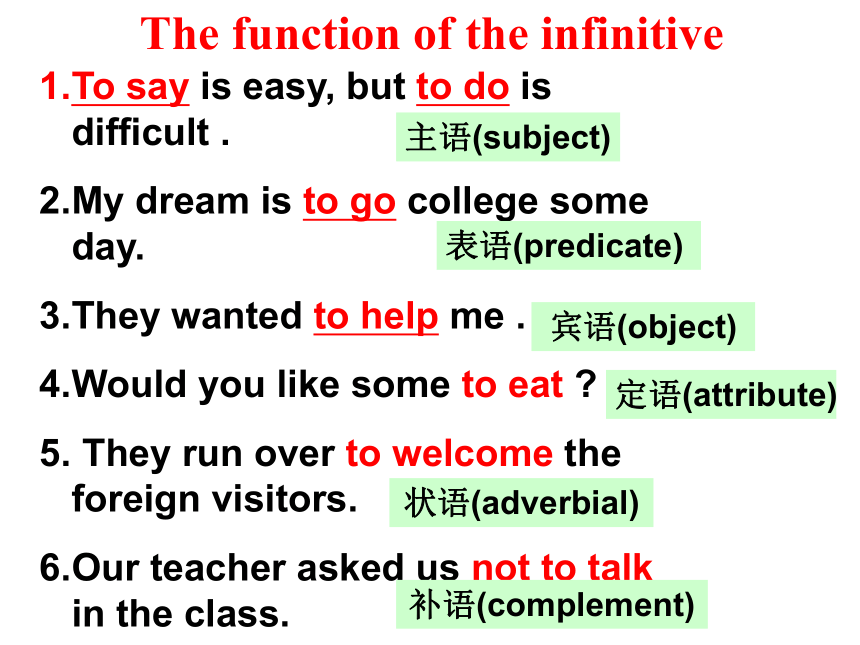
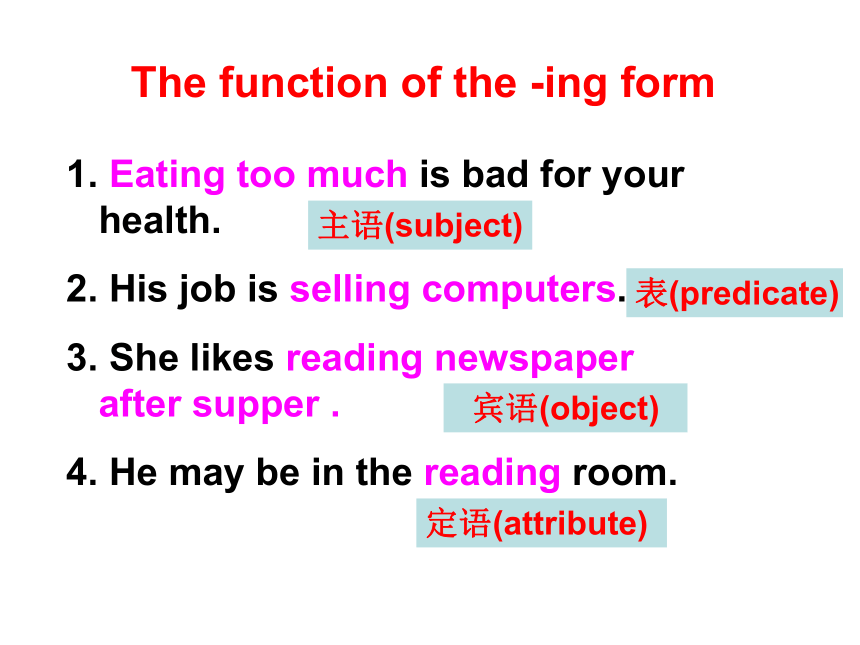
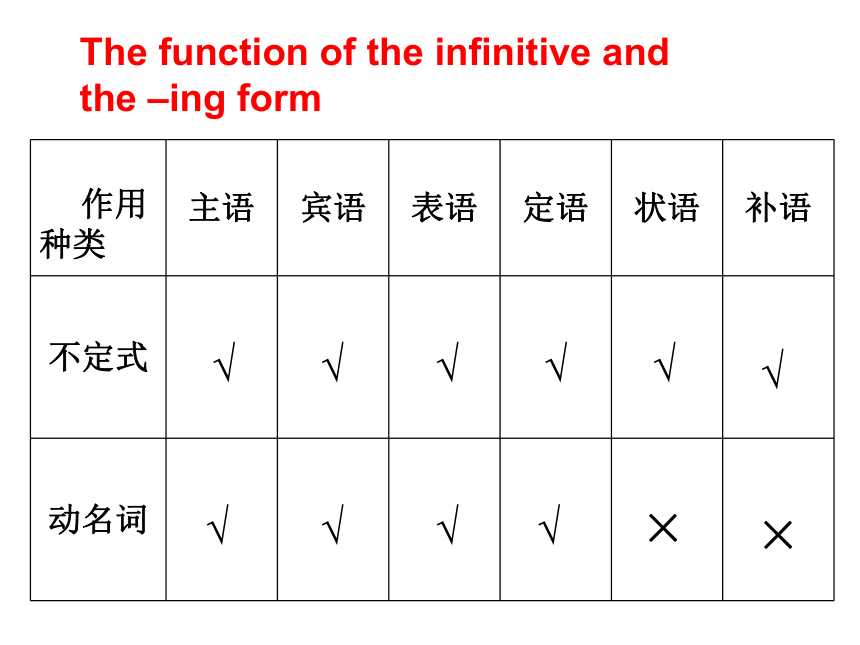
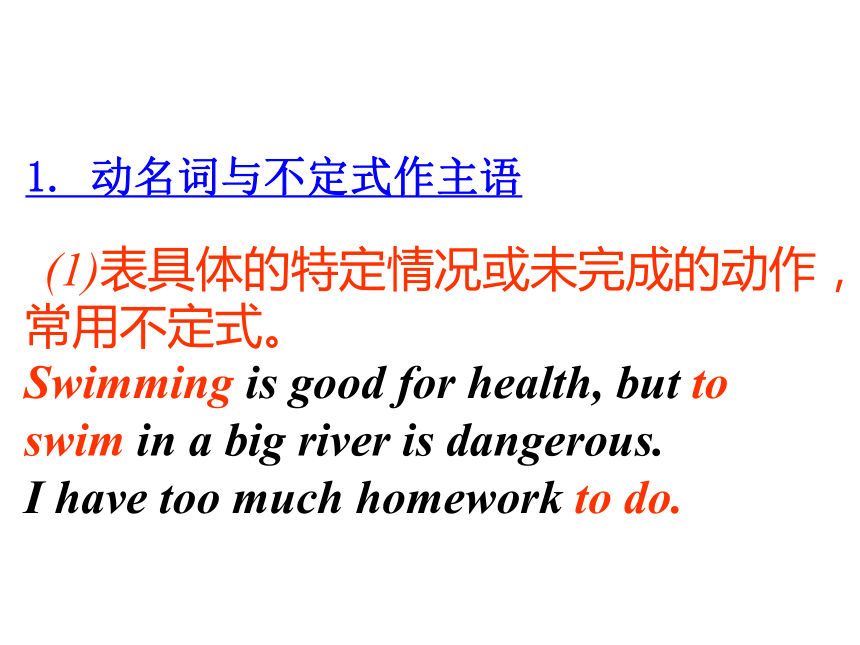


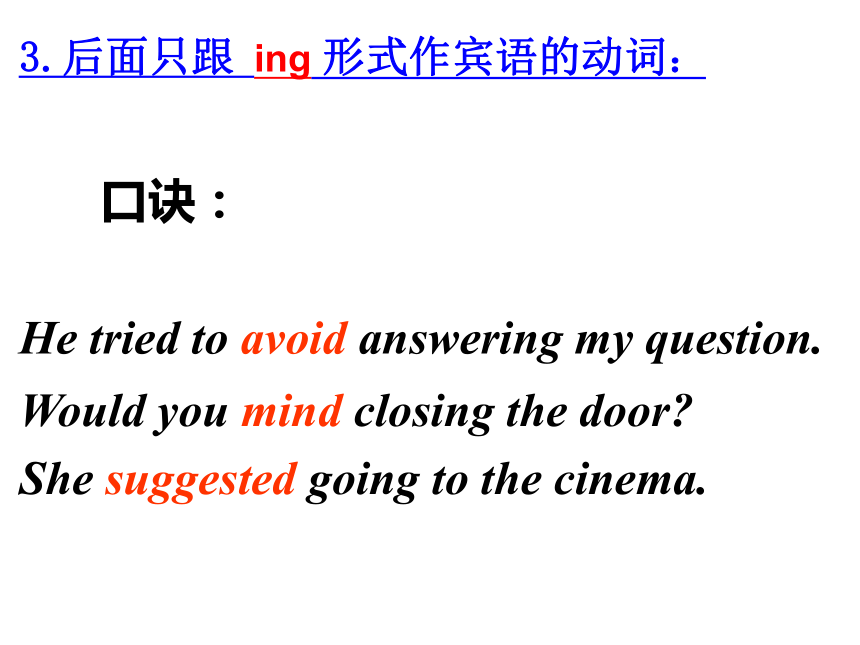
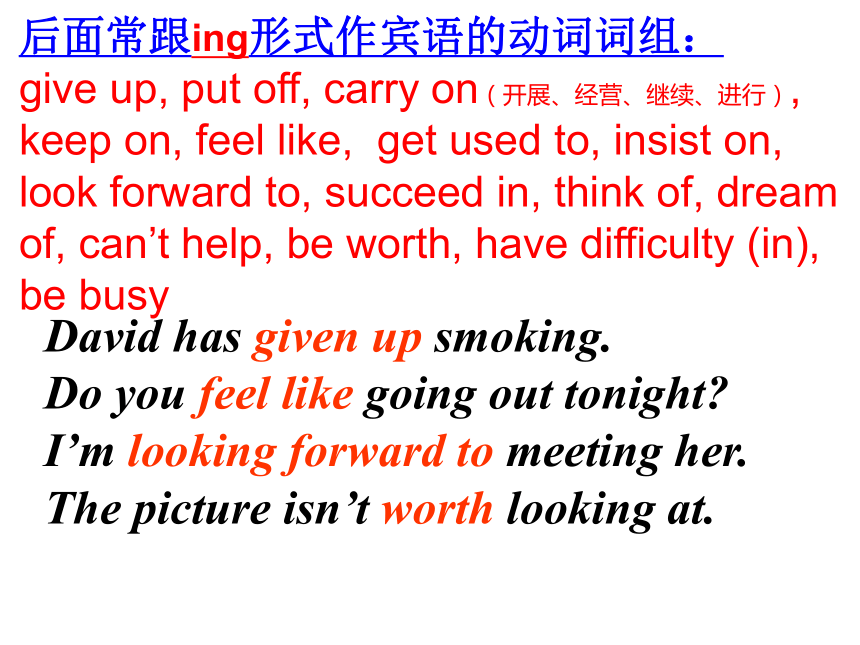
文档简介
课件25张PPT。Module Four Grammarthe –ing form and the infinitiveThe fun_ction of the infinitiveTo say is easy, but to do is difficult .
My dream is to go college some day.
They wanted to help me .
Would you like some to eat ?
They run over to welcome the foreign visitors.
Our teacher asked us not to talk in the class.主语(subject)表语(predicate)宾语(object)定语(attribute)状语(adverbial)补语(complement) Eating too much is bad for your health.
His job is selling computers.
She likes reading newspaper after supper .
He may be in the reading room.The fun_ction of the -ing form主语(subject)表(predicate)宾语(object)定语(attribute) The fun_ction of the infinitive and the –ing form√√√√√√√√√√××1. 动名词与不定式作主语 (1)表具体的特定情况或未完成的动作,常用不定式。
Swimming is good for health, but to swim in a big river is dangerous.
I have too much homework to do.(2). It + be (is/was) + adj. (necessary, important… ) + to do,
It + be +no use/ no good/ a waste of time + doing.
It is necessary to spend enough time on English if you want to learn it well.
It is no use arguing with him about it.2. 动名词与不定式作表语(1). 指具体的、特定情况下或未发生的动作,常用不定式。
Your work today is to carry these things upstairs.
(2). 主语的形式要和表语保持一致。
To see is to believe.
Seeing is believing.3.后面只跟 ing 形式作宾语的动词:He tried to avoid answering my question.Would you mind closing the door?She suggested going to the cinema.口诀: 后面常跟ing形式作宾语的动词词组:
give up, put off, carry on(开展、经营、继续、进行), keep on, feel like, get used to, insist on, look forward to, succeed in, think of, dream of, can’t help, be worth, have difficulty (in), be busyDavid has given up smoking.
Do you feel like going out tonight?
I’m looking forward to meeting her.
The picture isn’t worth looking at.4.只能跟不定式作宾语的动词
promise, demand, ask, aim, pretend, wish, hope, expect, manage, afford, offer, agree, learn, prepare, claim, dare, decide, refuse, determine等。
He failed to pass the driving test.
He offered to take the child home.
I can’t afford to buy a car.5.有些词后跟不定式或动名词意义不同:
remember, forget; try; mean; stop, go on; regret;need, requireregret doing sth. 后悔或遗憾做某事(已做)
regret to do sth.后悔或遗憾做某事(未做)
I regret telling him the secret.
I regret to tell you that you don`t pass the exam
Remenber/forget doing sth.
记得/忘记做某事(已做)
remember/forget to do sth.
记得/忘记做某事(未做)Mean doing sth.意味着做某事
Mean to do sth. 打算做某事。
Stop doing sth .停止正在做的事情
Stop to do sth.停下来去做另一件事情。
Go on doing sth.继续/不停地做某事(同一件)。
Go on to do sth.继续/不停地做某事(做完一件事后继续去做另一件事)6. need, require, want 表示“想要、需要”时,后面接动名词,表示被动含义,相当于接不定式的被动形式(to be done)
The flowers need watering.
=The flowers need to be watered.
My watch requires fixing.
=My watch requires to be fixed
Complete the following sentences:1. He is so interested in English that he will never get tired of _________ speaking it with his classmates.
2. The astronaut hopes ______ out of his space- ship and walk in space.
3. At the end of the term, all the students look forward to _______ some holiday.
4. Would you please turn down the radio? I can’t stand ________ to such noise all the time.draw, practise, spend, step, listen, send, have, control, move, work, help practisingto stephavinglistening5. China has succeeded in _______ up many satellites into space.
6. The boy attempted ________ the boat all by himself, but failed.
7. The man went on ________ until late night every day because he had to complete the task in time.
8. Once I have promised ______ you, I will try my best.sendingto controlworkingto helpdraw, practise, spend, step, listen, send, have, control, move, work, help Choose the best answers:
1.—Robert is indeed a wise man.
—Oh, yes. I have regretted ________ his advice!
A. to take B. taking C. not to take
D. not taking 4.John received an invitation to dinner, and with his work ______, he gladly accepted it.
A. finished B. finishing
C. having finished
D. was finished 5.—There is a story here in the paper about a 110-year-old man.
—My goodness! I can’t imagine
____ that old.
A. to be B. to have been
C. being D. having been 6.Tom sounds very much _____ in
the job, but I’m not sure whether
he can manage it.
A. interested B. interesting
C. interestingly D. interestedly 7.Only then _____how much damage had been caused.
A. she realized
B. she had realized
C. had she realized
D. did she realize用过给词的适当形式填空1. I’d prefer________(take) a bus rather than ride a bike to get there as it is a little bit far.
2. Tom was late again but he was lucky to escape _______(punish).
3. ---Did you enjoy yourself last night?
---Yes, it’s very nice of you. I appreciated _______(invite) to the party. to take being punished being invited/having been invited用过给词的适当形式填空4. Charles Babbage is generally considered ________(invent) the first computer.
6. No one can avoid ______(influence) by advertisements.
22. –Excuse me, can I smoke here?
-- Sorry. We don’t allow _____(smoke) here to have invented being influenced smoking用过给词的适当形式填空7. I can’t afford _________(buy) her a piano.
8. Your shirt needs ________(iron); you’d better have it done today.
9. After waking up, he remembered _______(attack) and hit on the head with a stick in his dream.
21. When asked by the police, he said that he remembered______(arrive) at the party, but not _____(leave) to buy ironing being attacked/having been attacked arriving leaving用过给词的适当形式填空10. The visitors you referred to are looking forward to _______(show) around our school.
11. I cannot imagine _______(they) guys rising against the proposal.
12. We would appreciate you ______(let) us know of any problems.
20. his expression on face means __________ (refuse) by Lily. being shown them letting being refused用过给词的适当形式填空13. Tony has promised ______(take) us around the gallery.
14. He succeeded in _______(make) himself understand the speech ______(give) by the foreigner.
15. ---What do you think of the concert?
--- I really enjoy it . I didn’t expect it was as _______(wonder) as it is now.
to take making given wonderful
My dream is to go college some day.
They wanted to help me .
Would you like some to eat ?
They run over to welcome the foreign visitors.
Our teacher asked us not to talk in the class.主语(subject)表语(predicate)宾语(object)定语(attribute)状语(adverbial)补语(complement) Eating too much is bad for your health.
His job is selling computers.
She likes reading newspaper after supper .
He may be in the reading room.The fun_ction of the -ing form主语(subject)表(predicate)宾语(object)定语(attribute) The fun_ction of the infinitive and the –ing form√√√√√√√√√√××1. 动名词与不定式作主语 (1)表具体的特定情况或未完成的动作,常用不定式。
Swimming is good for health, but to swim in a big river is dangerous.
I have too much homework to do.(2). It + be (is/was) + adj. (necessary, important… ) + to do,
It + be +no use/ no good/ a waste of time + doing.
It is necessary to spend enough time on English if you want to learn it well.
It is no use arguing with him about it.2. 动名词与不定式作表语(1). 指具体的、特定情况下或未发生的动作,常用不定式。
Your work today is to carry these things upstairs.
(2). 主语的形式要和表语保持一致。
To see is to believe.
Seeing is believing.3.后面只跟 ing 形式作宾语的动词:He tried to avoid answering my question.Would you mind closing the door?She suggested going to the cinema.口诀: 后面常跟ing形式作宾语的动词词组:
give up, put off, carry on(开展、经营、继续、进行), keep on, feel like, get used to, insist on, look forward to, succeed in, think of, dream of, can’t help, be worth, have difficulty (in), be busyDavid has given up smoking.
Do you feel like going out tonight?
I’m looking forward to meeting her.
The picture isn’t worth looking at.4.只能跟不定式作宾语的动词
promise, demand, ask, aim, pretend, wish, hope, expect, manage, afford, offer, agree, learn, prepare, claim, dare, decide, refuse, determine等。
He failed to pass the driving test.
He offered to take the child home.
I can’t afford to buy a car.5.有些词后跟不定式或动名词意义不同:
remember, forget; try; mean; stop, go on; regret;need, requireregret doing sth. 后悔或遗憾做某事(已做)
regret to do sth.后悔或遗憾做某事(未做)
I regret telling him the secret.
I regret to tell you that you don`t pass the exam
Remenber/forget doing sth.
记得/忘记做某事(已做)
remember/forget to do sth.
记得/忘记做某事(未做)Mean doing sth.意味着做某事
Mean to do sth. 打算做某事。
Stop doing sth .停止正在做的事情
Stop to do sth.停下来去做另一件事情。
Go on doing sth.继续/不停地做某事(同一件)。
Go on to do sth.继续/不停地做某事(做完一件事后继续去做另一件事)6. need, require, want 表示“想要、需要”时,后面接动名词,表示被动含义,相当于接不定式的被动形式(to be done)
The flowers need watering.
=The flowers need to be watered.
My watch requires fixing.
=My watch requires to be fixed
Complete the following sentences:1. He is so interested in English that he will never get tired of _________ speaking it with his classmates.
2. The astronaut hopes ______ out of his space- ship and walk in space.
3. At the end of the term, all the students look forward to _______ some holiday.
4. Would you please turn down the radio? I can’t stand ________ to such noise all the time.draw, practise, spend, step, listen, send, have, control, move, work, help practisingto stephavinglistening5. China has succeeded in _______ up many satellites into space.
6. The boy attempted ________ the boat all by himself, but failed.
7. The man went on ________ until late night every day because he had to complete the task in time.
8. Once I have promised ______ you, I will try my best.sendingto controlworkingto helpdraw, practise, spend, step, listen, send, have, control, move, work, help Choose the best answers:
1.—Robert is indeed a wise man.
—Oh, yes. I have regretted ________ his advice!
A. to take B. taking C. not to take
D. not taking 4.John received an invitation to dinner, and with his work ______, he gladly accepted it.
A. finished B. finishing
C. having finished
D. was finished 5.—There is a story here in the paper about a 110-year-old man.
—My goodness! I can’t imagine
____ that old.
A. to be B. to have been
C. being D. having been 6.Tom sounds very much _____ in
the job, but I’m not sure whether
he can manage it.
A. interested B. interesting
C. interestingly D. interestedly 7.Only then _____how much damage had been caused.
A. she realized
B. she had realized
C. had she realized
D. did she realize用过给词的适当形式填空1. I’d prefer________(take) a bus rather than ride a bike to get there as it is a little bit far.
2. Tom was late again but he was lucky to escape _______(punish).
3. ---Did you enjoy yourself last night?
---Yes, it’s very nice of you. I appreciated _______(invite) to the party. to take being punished being invited/having been invited用过给词的适当形式填空4. Charles Babbage is generally considered ________(invent) the first computer.
6. No one can avoid ______(influence) by advertisements.
22. –Excuse me, can I smoke here?
-- Sorry. We don’t allow _____(smoke) here to have invented being influenced smoking用过给词的适当形式填空7. I can’t afford _________(buy) her a piano.
8. Your shirt needs ________(iron); you’d better have it done today.
9. After waking up, he remembered _______(attack) and hit on the head with a stick in his dream.
21. When asked by the police, he said that he remembered______(arrive) at the party, but not _____(leave) to buy ironing being attacked/having been attacked arriving leaving用过给词的适当形式填空10. The visitors you referred to are looking forward to _______(show) around our school.
11. I cannot imagine _______(they) guys rising against the proposal.
12. We would appreciate you ______(let) us know of any problems.
20. his expression on face means __________ (refuse) by Lily. being shown them letting being refused用过给词的适当形式填空13. Tony has promised ______(take) us around the gallery.
14. He succeeded in _______(make) himself understand the speech ______(give) by the foreigner.
15. ---What do you think of the concert?
--- I really enjoy it . I didn’t expect it was as _______(wonder) as it is now.
to take making given wonderful
